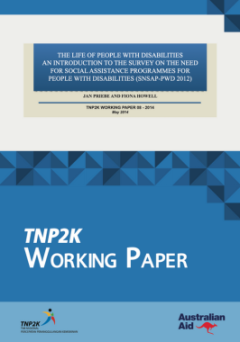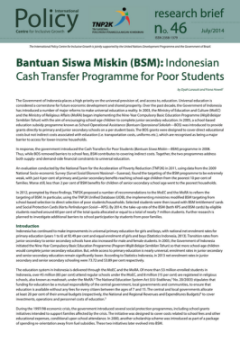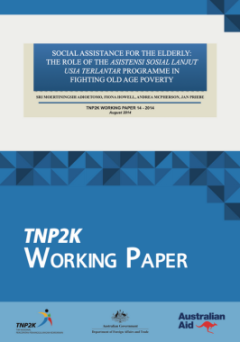Ditapis dengan

The Life Of People With Disabilities An Introduction To The Survey On The Nee…
In 2012, the Demographic Institute of the University of Indonesia conducted on behalf of TNP2K a unique survey on disability that sheds new light on the needs and living conditions of people with disabilities (PWDs) in Indonesia. This new dataset is called the Survey on the Need for Social Assistance Programmes for People with Disabilities (SNSAP-PWD 2012) and is available free of charge from T…
- Edisi
- TNP2K Working Paper 08 – 2014
- ISBN/ISSN
- -
- Deskripsi Fisik
- vii, 9 Halaman, PDF
- Judul Seri
- Working Paper
- No. Panggil
- 362.4 PRI t

Bantuan Siswa Miskin (BSM): Indonesian Cash Transfer Programme for Poor Students
The Government of Indonesia places a high priority on the universal provision of, and access to, education. Universal education is considered a cornerstone for future economic development and shared prosperity. Over the past decade, the Government of Indonesia has introduced a number of major reforms to make universal education a reality. In 2003, the Ministry of Education and Culture (MoEC) …
- Edisi
- 1
- ISBN/ISSN
- -
- Deskripsi Fisik
- PDF, 6 Halaman
- Judul Seri
- Policy Brief
- No. Panggil
- 362.5 LAR.B

Social Assistance for The Elderly: The Role of The Asistensi Sosial Lanjut Us…
Indonesia has undergone a demographic transition since the 1970s that has led to significant changes in the population age structure. Life expectancy increased from 45 years to 67 years. The number of elderly people (60 years and above) rose from about 5 million in 1970 to 18 million in 2010, and is projected to increase to over 80 million by 2050. The economic situation of the elderly is pr…
- Edisi
- TNP2K Working Paper 14 - 2014
- ISBN/ISSN
- -
- Deskripsi Fisik
- PDF, 52 Halaman
- Judul Seri
- Working Paper
- No. Panggil
- 361.1 ADI. S
 Karya Umum
Karya Umum  Filsafat
Filsafat  Agama
Agama  Ilmu-ilmu Sosial
Ilmu-ilmu Sosial  Bahasa
Bahasa  Ilmu-ilmu Murni
Ilmu-ilmu Murni  Ilmu-ilmu Terapan
Ilmu-ilmu Terapan  Kesenian, Hiburan, dan Olahraga
Kesenian, Hiburan, dan Olahraga  Kesusastraan
Kesusastraan  Geografi dan Sejarah
Geografi dan Sejarah